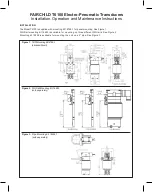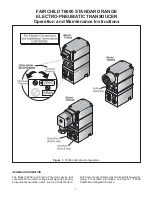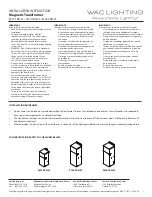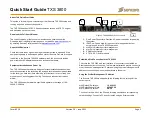
67
Reference Manual
00809-0400-4101, Rev BA
Safety Instrumented Systems Requirements
January 2018
Safety Instrumented Systems Requirements
7.5
Rosemount 2051G SIS operation and mainenance
7.5.1
Proof test
The following proof tests are recommended. All proof test procedures must be carried out by qualified
personnel.
to perform a Loop Test, Analog Output Trim, or Sensor Trim. Security switch
should be in the (
) position during proof test execution and repositioned in the (
) position after
execution.
7.5.2
Partial proof test
The partial suggested proof test consists of a power cycle plus reasonability checks of the transmitter
output. Reference the FMEDA Report for percent of possible DU failures in the device.
FMEDA report can be found
Certificates and Approvals
at
Emerson.com/Automation-Solutions/Pressure/Rosemount-2051
Required tools: Field Communicator and mA meter.
1. Bypass the safety function and take appropriate action to avoid a false trip.
2. Use HART communications to retrieve any diagnostics and take appropriate action.
3. Send a HART command to the transmitter to go to the high alarm current output and verify that the
analog current reaches that value
.
(1)
See
“Verifying alarm level” on page 21
4. Inspect the device for any leaks, visible damage or contamination.
5. Send a HART command to the transmitter to go to the low alarm current output and verify that the
analog current reaches that value
.
(2)
6. Remove the bypass and otherwise restore the normal operation.
7. Place the Security switch in the (
) position.
7.5.3
Comprehensive proof test
The comprehensive proof test consists of performing the same steps as the simple suggested proof test
but with a two point calibration of the pressure sensor in place of the reasonability check. Reference the
FMEDA Report for percent of possible DU failures in the device.
Required tools: Field Communicator and pressure calibration equipment.
1. Bypass the safety function and take appropriate action to avoid a false trip.
2. Use HART communications to retrieve any diagnostics and take appropriate action.
3. Send a HART command to the transmitter to go to the high alarm current output and verify that the
analog current reaches that value.
“Verifying alarm level” on page 21
4. Send a HART command to the transmitter to go to the low alarm current output and verify that the
analog current reaches that value.
5. Inspect the device for any leaks, visible damage or contamination.
6. Perform a two-point calibration of the sensor (see
“Trim the pressure signal” on page 48
) over the full
working range and verify the current output at each point.
1.
This tests for compliance voltage problems such as a low loop power supply voltage or increased wiring distance. This also tests for other possible failures.
2.
This tests for possible quiescent current related failures.
Summary of Contents for Rosemount 2051G
Page 2: ......
Page 10: ...2 Reference Manual 00809 0400 4101 Rev BA Introduction January 2018 Introduction ...
Page 34: ...26 Reference Manual 00809 0300 4410 Rev BA Configuration January 2018 Configuration ...
Page 72: ...64 Reference Manual 00809 0400 4101 Rev BA Troubleshooting January 2018 Troubleshooting ...
Page 89: ......
















































